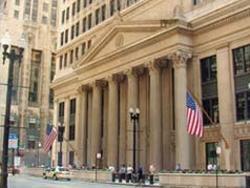Powell Anticipates Higher Prices & Weaker Growth Due to Tariffs
Arlington, VA, April 7, 2025”-Federal Reserve Chair Jerome Powell said the U. S. economy was likely to face a period of higher prices and weaker growth than seemed possible a few weeks ago because of larger-than-anticipated tariff hikes announced by President Trump,” reports the Wall Street Journal.
“Powell laced his remarks Friday with an undercurrent of caution about how the central bank would be able to address any fallout. Officials want to ensure one-time price increases don’t lead to persistently higher inflation.
“In 2019, the Fed pre-empted potential fallout from Trump’s trade war with China by cutting rates before weakness was evident in the economy. But Powell hinted that the current situation would be different. Because inflation has been elevated in recent years and because the current round of tariffs is much larger, the central bank this time could wait to cut rates until signs of economic weakness are more apparent.
“‘We’re well positioned to address whatever may come. And in the meantime, I’d say we’re waiting for greater clarity before we consider adjustments,’ Powell said at a conference for business journalists.
“Stocks extended steep losses on Friday after China announced it would impose an additional 34% tariff-the same as what Trump announced on Wednesday.”
Ahead of Powell’s remarks, Trump said he hoped the Fed chair would cut interest rates. ‘He is always ‘late,’ but he could now change his image, and quickly,’ Trump said on his social-media platform.
“Powell said the central bank didn’t ‘need to be in a hurry’ to cut rates, repeating language he has often used to signal a rate cut isn’t on the table at the Fed’s next policy meeting, which is May 6-7. ‘You’ll know more…as the months go by. It’s hard to say exactly when you’ll know, but clearly that learning process is ongoing,’ he said.
“Powell highlighted how the central bank is focused above all on ensuring that the public expects price growth to slow down after any cost increases that result from tariffs.
“Officials pay particularly close attention to what consumers, investors and businesses expect to happen to inflation over several years because they believe those expectations can be self-fulfilling.”
